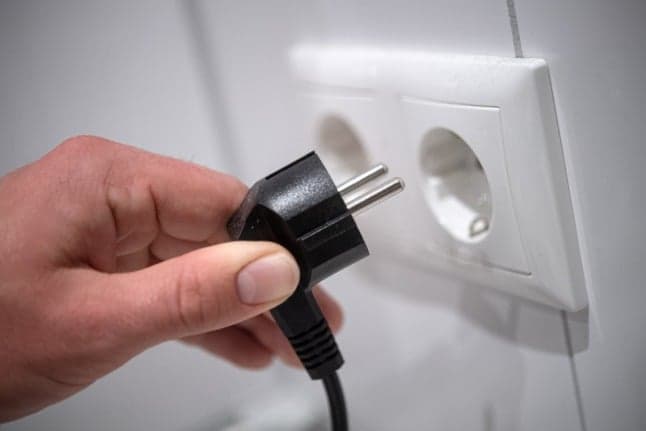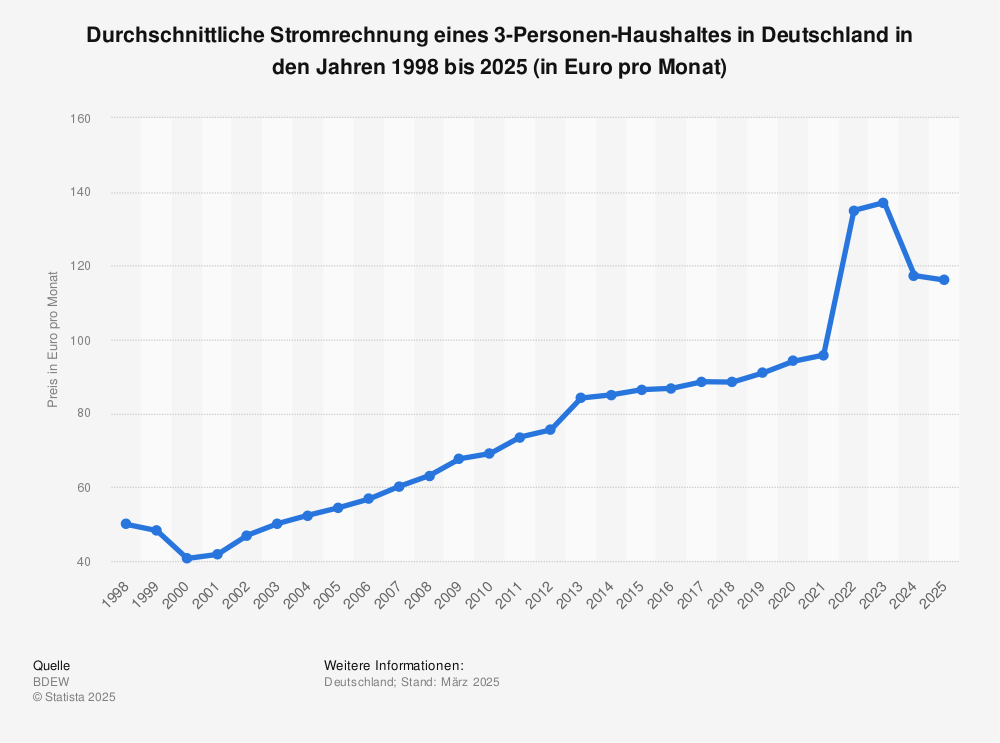But it may have little impact on energy bills due to factors like rising energy prices and increasing grid fees.
COMPARE: German electricity prices among highest in the world

Electricity prices in Germany are among the most expensive in the world, a new analysis shows.
An international comparison has found that German consumers are spending a huge amount of money on electricity compared to other countries.
The analysis of 133 countries, compiled by comparison portal Verivox using data from the energy service Global Petrol Prices and adjusted for purchasing power, found that Germany ranked in the top 15 of highest electricity costs worldwide.
Overall, Germany was in 15th place in the international ranking, according to German news site Spiegel. Most countries with higher electricity prices were crisis-hit developing countries such as Rwanda, Sierra Leone and Burkina Faso.
According to Verivox, the only EU countries where electricity prices were even higher than Germany were the Czech Republic (13th) and Romania (14th).
READ ALSO: How households in Germany can tackle rising energy costs
The table below put together by Spiegel shows the cost per kilowatt hour of electricity in dollar-cent
Among G20 countries, Germany has by far the most expensive electricity. In the next G20 countries on the list - Italy (33rd) and the UK (44th) - electricity prices are about 10 and 12.5 cents cheaper respectively, adjusted for purchasing power.
In many other countries with a high standard of living, electricity is at least 50 percent cheaper than in Germany. These include Canada, Norway, the USA, Switzerland, Finland, Sweden and the Netherlands.
The data from Global Petrol Prices is from the second quarter of this year. What's more, the current price surge in Germany has not yet been taken into account in the calculations.
The average electricity prices in the different countries were calculated on the basis of tariffs of selected suppliers and data from state authorities.
The country comparison is adjusted for purchasing power. That means it takes into account that in a country like Germany, where the per capita economic output is around 45,733 Dollars, it is significantly easier to spend more money on electricity than in Kenya, for example, where per capita GDP is only around 2,039 Dollars.
Why are electricity prices so high in Germany?
In October 2021, German consumers paid on average of 34.79 cents per kilowatt hour of electricity, according to Verivox.
It's the fourth month in a row that costs have risen to a record level. And it forms part of a wider trend. Within the past 12 months, electricity has become more expensive for consumers by an average of 20.9 percent.
READ ALSO: Why German electricity bills are hitting record highs
Since the year 2000, household electricity bills have on average doubled in price.
A three-person household in Germany now pays an average of €93 a month on their electricity bill, up from €41 twenty years ago.

Average electricity bill for a 3-person household (1998-2021). Mehr Statistiken finden Sie bei Statista
READ MORE: German consumers ‘pay the highest electricity prices in Europe’
Experts say the rise in electricity prices over the past 20 years in Germany is mainly due to increasing taxes, levies and surcharges.
One of the main factors is Germany’s public investment in renewable energy sources, which has been financed through a tariff called the EEG system.
The system promises fixed prices to wind and solar providers to try and stimulate growth in the sector. But it has always been controversial because industries have been exempt from paying it, meaning that private households have to fork out for it.
The German government announced last month that it will lower the levy from 2022 to help ease the burden on households.
On the wholesale exchange, electricity has become about 140 percent more expensive since the beginning of the year.
Comments
See Also
An international comparison has found that German consumers are spending a huge amount of money on electricity compared to other countries.
The analysis of 133 countries, compiled by comparison portal Verivox using data from the energy service Global Petrol Prices and adjusted for purchasing power, found that Germany ranked in the top 15 of highest electricity costs worldwide.
Overall, Germany was in 15th place in the international ranking, according to German news site Spiegel. Most countries with higher electricity prices were crisis-hit developing countries such as Rwanda, Sierra Leone and Burkina Faso.
According to Verivox, the only EU countries where electricity prices were even higher than Germany were the Czech Republic (13th) and Romania (14th).
READ ALSO: How households in Germany can tackle rising energy costs
The table below put together by Spiegel shows the cost per kilowatt hour of electricity in dollar-cent
Among G20 countries, Germany has by far the most expensive electricity. In the next G20 countries on the list - Italy (33rd) and the UK (44th) - electricity prices are about 10 and 12.5 cents cheaper respectively, adjusted for purchasing power.
In many other countries with a high standard of living, electricity is at least 50 percent cheaper than in Germany. These include Canada, Norway, the USA, Switzerland, Finland, Sweden and the Netherlands.
The data from Global Petrol Prices is from the second quarter of this year. What's more, the current price surge in Germany has not yet been taken into account in the calculations.
The average electricity prices in the different countries were calculated on the basis of tariffs of selected suppliers and data from state authorities.
The country comparison is adjusted for purchasing power. That means it takes into account that in a country like Germany, where the per capita economic output is around 45,733 Dollars, it is significantly easier to spend more money on electricity than in Kenya, for example, where per capita GDP is only around 2,039 Dollars.
Why are electricity prices so high in Germany?
In October 2021, German consumers paid on average of 34.79 cents per kilowatt hour of electricity, according to Verivox.
It's the fourth month in a row that costs have risen to a record level. And it forms part of a wider trend. Within the past 12 months, electricity has become more expensive for consumers by an average of 20.9 percent.
READ ALSO: Why German electricity bills are hitting record highs
Since the year 2000, household electricity bills have on average doubled in price.
A three-person household in Germany now pays an average of €93 a month on their electricity bill, up from €41 twenty years ago.

Average electricity bill for a 3-person household (1998-2021). Mehr Statistiken finden Sie bei Statista
READ MORE: German consumers ‘pay the highest electricity prices in Europe’
Experts say the rise in electricity prices over the past 20 years in Germany is mainly due to increasing taxes, levies and surcharges.
One of the main factors is Germany’s public investment in renewable energy sources, which has been financed through a tariff called the EEG system.
The system promises fixed prices to wind and solar providers to try and stimulate growth in the sector. But it has always been controversial because industries have been exempt from paying it, meaning that private households have to fork out for it.
The German government announced last month that it will lower the levy from 2022 to help ease the burden on households.
On the wholesale exchange, electricity has become about 140 percent more expensive since the beginning of the year.
Join the conversation in our comments section below. Share your own views and experience and if you have a question or suggestion for our journalists then email us at [email protected].
Please keep comments civil, constructive and on topic – and make sure to read our terms of use before getting involved.
Please log in here to leave a comment.